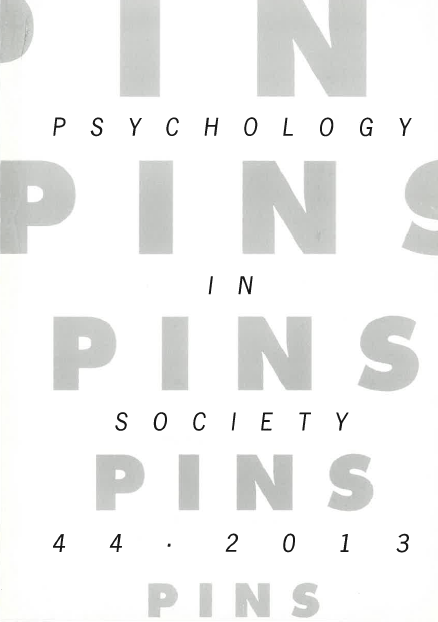“A LOT OF THEM ARE GOOD BUGGERS”: THE AFRICAN “FOREIGNER” AS SOUTH AFRICA’S DISCURSIVE OTHER
DOI:
https://doi.org/10.17159//2309-8708/2013/n44a2Keywords:
xenophobia, Self-Other, foreigner, citizen, discourse, prejudice, nation, subject positionAbstract
Levels of xenophobia in South Africa have risen precipitously since the early 1990s, but this phenomenon does not appear to have been researched rigorously within psychology. This exploratory study looks at how seven South African “citizens”1 talk about African “foreigners”¹ in South Africa, using a synthetic discursive lens which analyses the Self-Other relationships which are constructed. Subject positioning, ideological dilemmas and rhetorical work are used as analytical tools. Analysis reveals that a discursive relationship of common humanity leads to compassionate inclusivity, but the positioning of African “foreigners” as inferior/serviceable or threatening justifies their exploitation or exclusion, whilst enabling participants to “dodge the identity of prejudice”. National identity was constructed as one of fragile superiority over other African countries, resulting in a perceived need to protect the nation from outsiders. Participants took up familial identity positions, and this discursive mobilisation of the metaphor of “family” mirrors ideological models of the function of the state as an imaginary agency responsible for the protection and care of the citizenry.
Downloads
Downloads
Published
How to Cite
Issue
Section
License
This journal is an open access journal, and the authors' and journal should be properly acknowledged, when works are cited.
Authors may use the publishers version for teaching purposes, in books, theses, dissertations, conferences and conference papers.
A copy of the authors’ publishers version may also be hosted on the following websites:
- Non-commercial personal homepage or blog.
- Institutional webpage.
- Authors Institutional Repository.
The following notice should accompany such a posting on the website: “This is an electronic version of an article published in PINS, Volume XXX, number XXX, pages XXX–XXX”, DOI. Authors should also supply a hyperlink to the original paper or indicate where the original paper (http://www.journals.ac.za/index.php/pins) may be found.
Authors publishers version, affiliated with the Stellenbosch University will be automatically deposited in the University’s’ Institutional Repository SUNScholar.
Articles as a whole, may not be re-published with another journal.
The copyright of the article(s) lies with the author(s).
The copyright of the journal lies with PINS-psychology in Society.
The following license applies:
Attribution CC BY-NC-ND 4.0 - https://creativecommons.org/licenses/by-nc-nd/4.0/

